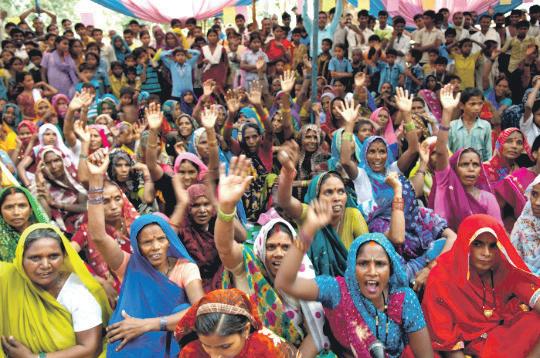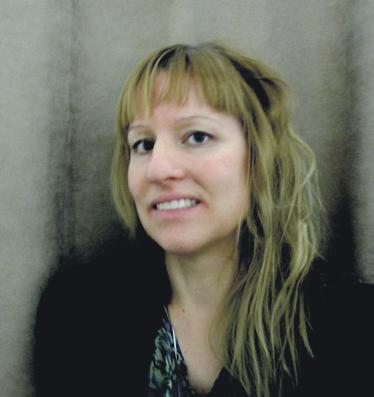
5 minute read
Empowering India’s women
from 2013-02 Melbourne
by Indian Link
Several organisations within India are doing their best to support and empower women to face societal challenges
BY LEANNE WOODWARD
With recent extensive media attention covering incidents of rape in India, the Indian government must be feeling some pressure to act more diligently toward such horrendous acts, and to start improving awareness about the importance of treating women decently and with value.
India, although part of the modern world, is also very traditional. Women still largely hold traditional roles of managing households, of being housewives and mothers. At the same time, many women still face issues of child marriage, gendercide, rape and its shame and stigma, forced marriages, physical and/or mental abuse, widowed and outcaste, and of having less opportunity than their male counterparts in work and education. The Indian government is yet to address these issues adequately, according to modern views of basic human rights.
According to the 2011 Indian census, there are 94 women to every 100 men. Surely if not now, at some stage Indian women will collectively find their voice and when this happens, this 50% of the population should be hard to ignore. Time is just waiting for the day when Indian women realise the influence they possess which presently lies latent in their hands, that will impact decisions and values of the whole country, and give them the power to run their own lives.
The Indian Women’s Movement (IWM)
To facilitate empowerment of Indian women including the most destitute, I found that there are many organisations currently working towards this objective. I met the founder of the Indian Women’s Movement, Ms Staci Luton who is passionate about social justice and empowerment of women. Her future dream is to set up welfare centres/sanctuaries across India that will cater to raped, abused, and ostracized women. These sanctuaries will provide compassion, safety, therapy, support and education, with the aim of reintroducing these women back into society as more empowered women. Ms Luton is a graduate of American Indian studies, sociology, international relations and peacekeeping, and her studies interested her in the cause of empowerment of women in India. Many of Ms Luton’s projects and work will be done under the umbrella of the Indian Women’s Movement, IWM (www.indianwomensmovement. com). Maharaja Ramlaxman Singh Ratlam, co-founder of IWM, outlines the organisation’s commitment to giving of aid without discrimination. “India is changing. We now see more equal opportunities than ever before. We also see the destitute, persecuted and people in need in all communities. In all castes and creeds there are women who are rich and poor, abused and ostracized,” he says.
A current project of the IWM now in the pilot stage, is the development of ‘shakti’ meetings throughout India. Shakti meetings are run by local concerned women, who meet to identify specific needs of women in their local area and who then endeavour to address these needs with the help of the IWM. Ladies interested in participating or starting up a group contact the IWM directly.
The organisation relies largely on the generosity of people through donations, gifts of new and used toys, clothes, sewing machines, books and fabric. Spreading the word helps create awareness, and the IWM also welcomes volunteers.
In 2012, the University of NSW sent a group of volunteer students to teach in a women’s education centre in Rajasthan, run by one of the non-government organisations (NGO) endorsed by the IWM.
The IWM links people to these endorsed NGOs via their website. IWM-endorsed organisations do real grassroots work and are not motivated by ego or profit; but simply by empowering and helping women in need. Two such NGOs are Sambhali Trust and Udaan.
The Sambhali Trust
The Sambhali Trust whose motto is ‘Empowering women of today and tomorrow’, was founded by Govind Singh Rathore in 2006. Govind lost his father at the age of 14. As the oldest male member of the family, he was taken out of school to become the head of the household. It indicated a patriarchal society in which a widowed woman could have no status and could be outcast because of unforseen and uncontrollable circumstances. Govind’s experience through the women in his life gave him motivation to start the Sambhali Trust.
Today the organisation runs 12 programs, looking after 600 women in Jodhpur. This is possible thanks to the support of benefactors like Mr Tony Vila from the Lonely Planet Foundation, and Rotary International, including funds raised through the sale of products produced by the graduates of the sewing program.
The Sambhali Trust helps empower women through knowledge. They run classes for young children right through to adult women in English and mathematics, in hygiene principles, and in textiles and sewing. Graduates of the latter can earn from their learnt skills by producing garments, manchester and handmade toys which are sold at the Sambhali boutique and online. Online purchases can be made at www.sambhali-trust.org/.
Another program offered by the Sambhali Trust assists in setting up local self-help groups. Women in these groups devise methods of saving money so that they are able to take out loans and start a business. The program helps women take control of their lives and get on a path to independence.
Udaan
Udaan or ‘Wings to imagination’ (www.udaanforwomen.org), is an organisation principally working in the city of Jaipur. Shiva Naruka founded this organisation in 2011, and is yet to be recognised as an NGO as the application process takes 3 years. Shiva presently works without any assistance from the government, but thankfully, her family openly supports her choice of helping empower women and children in need. They have allowed her to use the home as an office, a school and a meeting place. From time to time Shiva receives words of discouragement; she understands not all people share her family’s openness about helping the poorest and most outcast of women.
‘Shakti’ meetings are run by local concerned women, who meet to identify specific needs of women in their local area and who then endeavour to address these needs with the help of the IWM.

Through Udaan, Shiva offers English language classes to help make ‘globally competent citizens’. Udaan also offers education and support to women and their children in issues of dowry, infanticide, marriage, widowhood, woman empowerment, and empowering one’s own children. Shiva says, “It is important to teach mothers not to put their children into a box, but rather to empower them so that they will grow wings to bring their ideas into reality.” She adds, “India should be careful about how they handle children, because they turn out as they are raised. Parents and peers need to change their ideas about widows, dowry, infanticide, education and women being empowered, so that their children will grow up and adopt the same ideas”.
How you can help
Apart from increasing global awareness of what’s being done currently to empower women in India, there is the need for a change in the culture and perception of women and their concerns. Indian women would greatly benefit through support from outside India via individuals and organisations, and through political pressure. By donating to the above organisations, Australians have the opportunity to participate in many ways to help make these changes happen.








